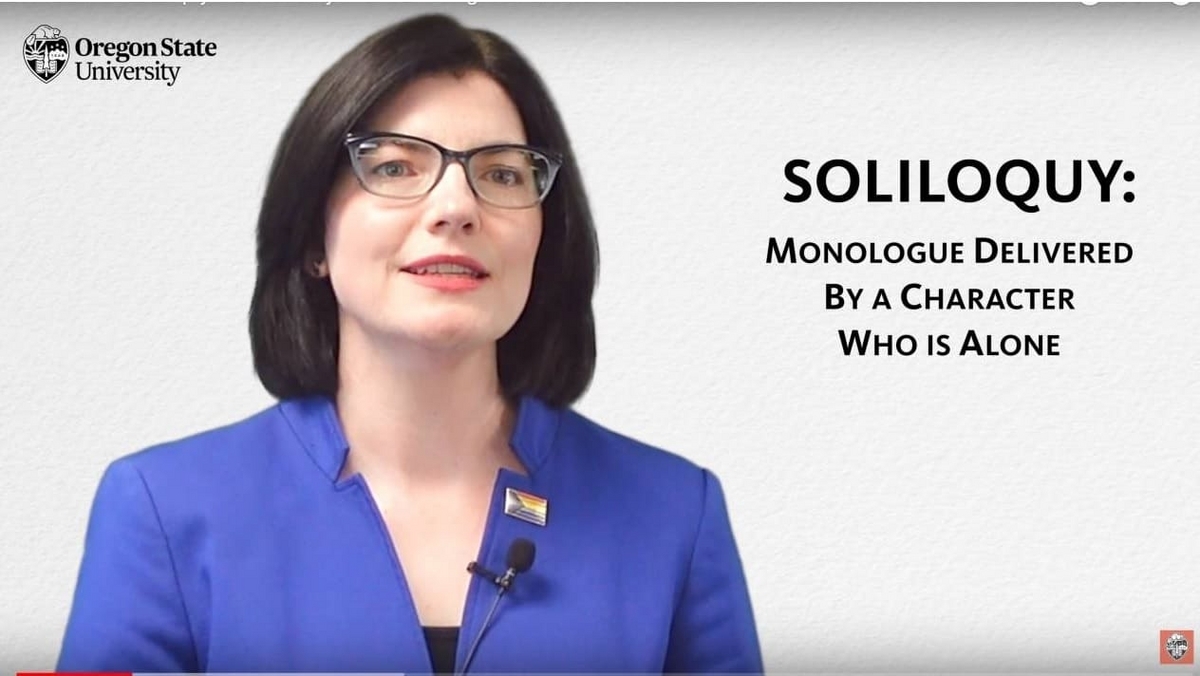What is a Soliloquy? - Definition and Examples
A)
1)
What is a soliloquy? By Rebecca Olson, Associate Professor of British Literature, Oregon State University
When two or more characters in a play talk to each other, it's called dialogue. When one character speaks for a long time, it's called a monologue. Soliloquy is the word we traditionally use to refer to a monologue delivered when the character is alone.
2)
In Shakespeare's plays, for example, there are many speeches that begin with a character saying something like "Now I am alone". And you know you are about to hear a soliloquy.
B)
3)
Soliloquies tend to have the effect of making you feel that you are gaining access to the character's true inner state. We assume they are being honest because they are talking to themselves.
At the beginning of Shakespeare's Richard III, for example, Richard is delivering a soliloquy and, when he realises that someone is coming, he says: "Dive thoughts, down to my soul". The implication is that the audience has heard things that he doesn't want everyone to know.
4)
Many people find that the intimacy created during a soliloquy makes it easy to empathise with the speaker, or can even make us complicit in whatever scheme the character has been plotting out loud. But sometimes this intimacy is itself a performance.
5)
For example, in a later soliloquy in the same scene of Richard III, Richard says that he intends to marry Lady Anne, not because he loves her, but "for some other secret close intention"; basically, for private reasons. At this point, the audience hears more than the other characters, but we don't get completely direct access; Richard still keeps some things to himself.
C)
6)
Some people would say that not all soliloquies are delivered when the character is alone on stage. The scholar James Hirsch defines them more broadly as "speeches not directed by a character to the ears of one or more other characters".
We might think of an extended aside, for example, as a kind of soliloquy. An aside is a speech that at least one other character on stage is obviously not meant to hear.
7)
Whether we define soliloquy as a monologue delivered when the actor is alone on stage, or simply as "speech addressed to oneself", what seems important is the effect the soliloquy has on the audience's connection with the character. This affective effect is something that playwrights manipulate in really interesting ways.
What is a Soliloquy? - Definition and Examples
https://liberalarts.oregonstate.edu/wlf/what-soliloquy-definition-and-examples
https://youtu.be/4ogkXqh2HaU
How to pronounce soliloquy | British English and American English pronunciation
https://www.youtube.com/watch?v=jFMZG270-2w
What is an example of a soliloquy?
https://www.youtube.com/watch?v=eorrK3IRntw
Mel Gibson - Hamlet's Soliloquy
https://www.youtube.com/watch?v=ei0fnP9s0KA
Balcony scene from Romeo & Juliet
https://www.youtube.com/watch?v=S0qao2xINsE
3. Prologue: Valjean's soliloguy - Les Misérables
https://www.youtube.com/watch?v=stwZJOkHgOE
Hugh Jackman ~ 'Soliloquy'
https://www.youtube.com/watch?v=QeQ3j6A0BiU
Frank Sinatra Soliloquy
https://www.youtube.com/watch?v=l1DGLhyPOew
The new story "Ulysses" can be read in the same order as "Odyssey!"
https://note.com/all1_accepter/n/nffab02f21a50
James Augustine Aloysius Joyce - Wikipedia
https://en.wikipedia.org/wiki/James_Joyce
Add info)
Speech: “To be, or not to be, that is the question” BY WILLIAM SHAKESPEARE (from Hamlet, spoken by Hamlet)
https://www.poetryfoundation.org/poems/56965/speech-to-be-or-not-to-be-that-is-the-question
https://en.wikipedia.org/wiki/To_be,_or_not_to_be
https://nosweatshakespeare.com/quotes/soliloquies/to-be-or-not-to-be/
https://youtu.be/xYZHb2xo0OI
To be, or not to be, that is the question:
Whether 'tis nobler in the mind to suffer
The slings and arrows of outrageous fortune,
Or to take arms against a sea of troubles
And by opposing end them. To die—to sleep,
No more; and by a sleep to say we end
The heart-ache and the thousand natural shocks
That flesh is heir to: 'tis a consummation
Devoutly to be wish'd. To die, to sleep;
To sleep, perchance to dream—ay, there's the rub:
For in that sleep of death what dreams may come,
When we have shuffled off this mortal coil,
Must give us pause—there's the respect
That makes calamity of so long life.
For who would bear the whips and scorns of time,
Th'oppressor's wrong, the proud man's contumely,
The pangs of dispriz'd love, the law's delay,
The insolence of office, and the spurns
That patient merit of th'unworthy takes,
When he himself might his quietus make
With a bare bodkin? Who would fardels bear,
To grunt and sweat under a weary life,
But that the dread of something after death,
The undiscovere'd country, from whose bourn
No traveller returns, puzzles the will,
And makes us rather bear those ills we have
Than fly to others that we know not of?
Thus conscience doth make cowards of us all,
And thus the native hue of resolution
Is sicklied o'er with the pale cast of thought,
And enterprises of great pith and moment
With this regard their currents turn awry
And lose the name of action.
